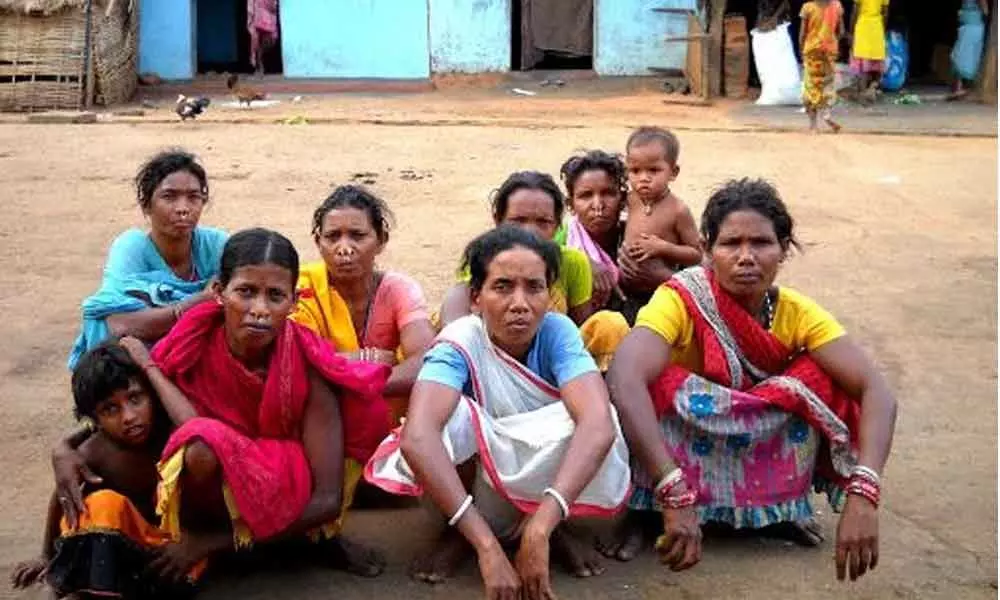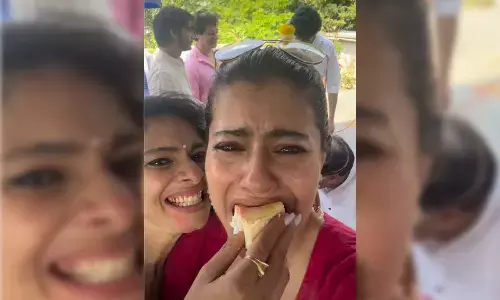Odisha's tribal heartland fights Covid

Odisha's tribal heartland fights Covid
Houses in Gotiguda hamlet in Odisha's Malkangiri district have a message painted on them: Students who are relatively weak in studies need remedial classes;
Houses in Gotiguda hamlet in Odisha's Malkangiri district have a message painted on them: Students who are relatively weak in studies need remedial classes; the school infrastructure needs a facelift. The 13-house hamlet is in Mathili tehsil, where the demography is dominated by scheduled tribe communities. A literacy rate of 35 per cent is bad even for the district's average of 48.54 per cent.
The village faces multiple development challenges even after 73 years of India's independence. Basic facilities like a well-connected road and electricity are still a distant dream for the villagers. The villagers have struggled to get a school in their village; there are 20 school-going children between the ages of 6 and 14 years. As a result, these children are forced to go to the school in Markapalli, two kilometres away.
But most importantly, the school has also been shut following the imposition of the countrywide lockdown to contain the spread of the novel coronavirus disease (Covid-19). Without electricity and other digital resources required to attend the government's online classes, these children are now being pushed to the margins of education. Recently, Odisha's School and Mass Education Minister Samir Ranjan Dash told journalists while unfurling the tricolour in Jajpur that the time was not right to reopen schools. "There are around six million students presently enrolled in Odisha schools out of which, only 2.2 million have access to online education through various means be it Siksha Sanjog, Dakhyata or Madhu App."
He further announced that his department was going to launch a 'Shiksha Samparka' programme where teachers would be sent to villages to teach children who lack resources to benefit from the government's online education initiative.
In India, 73 per cent of a total 1.04 million schools are government-run and 54 per cent of school-going children attend such schools. A report by UNESCO has also revealed that more than 143 million primary school children and more than 133 million secondary school children in India are likely to be affected by school closures due to the pandemic-induced lockdown.
The Right to Education Act 2009 is a progressive legislative framework that guarantees free and compulsory education for all children within the age group of 6-14 and mandates that a primary school (Class I to Class V) should be established within one kilometre from their habitation.
"Since the future of our children appears dismal, we chose to battle against the injustice and inequality that we face. Wall-writing is a step forward in our years-long struggle," Manguli Madhi, a parent of a school-going child of Gotiguda said.
Not just Gotiguda, but more than 6,000 villagers across Odisha's most remote and tribal-populated districts have painted their walls with these messages. A commoner may ponder over what these wall writings could mean but s/he would end up praising the spirit behind them. At a time when online classes by the Central and Odisha government are failing to reap benefits for underprivileged children as they lack required resources to take part in them, the wall writing campaign is of great relevance. "A wall-writing in a village may be perceived as mere brushwork by many of us. But this serves as a ray of hope to these people," says Gitanjali Mohanty of Shramajeebee Sangathan, Malkangiri, a district-level forum that organised this wall-writing campaign in the district.
However, to amplify their voices, they have joined the recently initiated national campaign on education led by the Atmashakti Trust, a non-profit that works in the state since the last 10 years on socio-economic and political empowerment of the most marginalised communities. The campaign seeks to activate government mechanisms to start remedial classes and improve school infrastructure across the country.
"Nothing will come easy for us until we raise our voices, be it for a ration card, old-age pension or any other local issues that concern us. Tribal and Dalit communities are always at the bottom of the government's developmental priority list and often face discrimination and social exclusion," Manima Jani, president of the Mahila Lok Bikash Sangathan, a women's collective in Koraput, said.
"In a State where 32.59 per cent population is below the poverty line according to the Niti Aayog SDG India Index Baseline report, it is evident that people have fewer choices. As a result, they use collective action as a tool to resist state apathy," Ruchi Kashyap, an expert on education, said."The challenges posed by the Covid-19 pandemic seem far more consequential for these tribal and other marginalised communities as a whole than the rest of the population, due to their close-knit communities living in rural areas, lack of awareness, limited resources of livelihood and poverty," Kashyap added.
Like many other States, schools in Odisha were among the first of many institutions that started shutting down as a precautionary measure to contain the spread of SARS-CoV-2. Hopes have decreased further as positive cases of coronavirus have seen an upsurge in many parts of the State. Schools and colleges, that were set to re-open, were directed to shut down. Children from the tribal and Dalit communities, who constitute 40 per cent of the state population and who depend on government schools for their education, were the worst sufferers due to this decision. "Everything else can wait but not education. Therefore, we decided to run a wall-writing campaign where we can build pressure on the government in favour of remedial classes and revamping school infrastructure in our villages," Sudhakar Pradhan, an active member of Jeebika Suraksha Mancha, Kandhamal, said.
What could be an operative medium to represent the voice of the masses at a time when Covid-19 has gripped us all? It is not that people have not tried. Earlier, they had opted for postcard campaigns, signature campaigns and other cost-effective and accessible means to reach out to the government and its machinery. But, due to the pandemic-induced lockdown, their choices were limited. Therefore, they opted to write on their walls, hoping that this will work for them. But, can wall-writings change their fate? Will these writings encode their hope into reality? "The repercussions are unclear as of now. But we still carry the hope that the government will hear us. Rather, we believe this initiative may serve as a tool to help bridge the missing link between the people's needs and the accountability of the government," Swarnalata Nayak, a member of the Lok Unnati Sangathan, that works for the upliftment of these communities in Balangir district, said.
There is a popular saying that we live by — "If you want to change the world, start at home". When a government appears to be apathetic towards the welfare of those who are at the bottom of the development pyramid, it underpins the genesis of a struggle-based movement.
But, how do these people learn to take actions? There, Odisha Shramajeebee Mancha (OSM) and Mahila Shramajeebee Mancha, Odisha (MSMO) come into the picture. OSM and MSMO are the two state-level apex bodies of people's collectives in Odisha that work in the field of education, health, agriculture, livelihood, women rights, water and sanitation and many other local issues in 17 districts of Odisha where a large chunk of the population are tribals and Dalits.
"We believe in collective action. If a large group of people or forums are raising their issues unitedly, it gives them the power to bargain, influence and negotiate with the government. As a people's collective, we educate communities to be informed and make them aware of their rights and entitlements so that these enable them to take actions on their own," Dasarathi Naik, an executive body member of OSM, said. "Societal change will occur only when people are aware and initiate actions to fight against inequalities and injustice," he added.
"After all, these writings on the wall are not a decoration to celebrate a festival or a sheer manifestation of imagination, but the anticipation of these villagers that policymakers will hear them," Naik said.
(Courtesy: Down To Earth)








